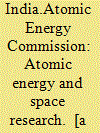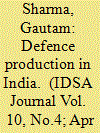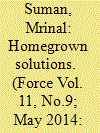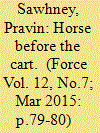| Srl | Item |
| 1 |
ID:
141883


|
|
|
|
|
| Publication |
New Delhi, Govt. Publications, 1970.
|
| Description |
vi, 41p.pbk
|
| Contents |
B
|
|
|
|
|
|
|
|
|
|
|
|
Copies: C:1/I:0,R:0,Q:0
Circulation
| Accession# | Call# | Current Location | Status | Policy | Location |
| 058377 | 333.7924094/IND 058377 | Main | On Shelf | General | |
|
|
|
|
| 2 |
ID:
184838


|
|
|
| 3 |
ID:
129950


|
|
|
| 4 |
ID:
137867


|
|
|
|
|
| Summary/Abstract |
The single most important lesson to emerge from the recently announced 2015 defence outlay is what comes out each year: there will never be enough money. Hence, instead of carping about lesser funds for increased military threats, it would be wiser to cut the coat according to the cloth.
|
|
|
|
|
|
|
|
|
|
|
|
|
|
|
|
| 5 |
ID:
127131


|
|
|
|
|
| Publication |
2013.
|
| Summary/Abstract |
In January 1950 President Harry S. Truman announced that the United States would proceed with further work to determine the feasibility of a 'Super', or hydrogen, bomb. The events leading up to that decision - counter-pressures and advocacy from a number of quarters, including the divided Atomic Energy Commission (AEC), the nuclear scientists, Congress and the Pentagon - is well known. Less attention has been given to how the story of the Super came to be told in official and popular publications. Admiral Lewis L. Strauss, rogue member of the AEC, later presidential adviser on atomic affairs and AEC chairman, was one of the most vigorous advocates of developing thermonuclear weapons. He was also a highly skilled player of bureaucratic politics. This article draws upon the Strauss archives to examine how he used his position and his contacts to shape the history of the H-bomb to his own political advantage.
|
|
|
|
|
|
|
|
|
|
|
|
|
|
|
|